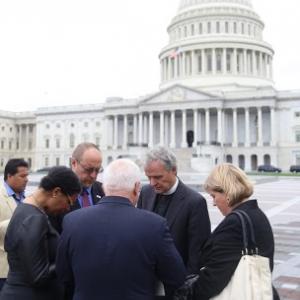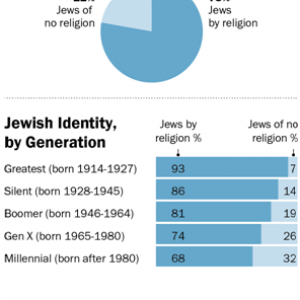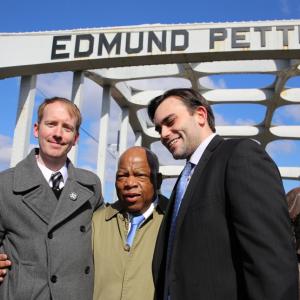
Sandi Villarreal is former editor-in-chief of Sojourners. She came to Sojourners in 2012 after starting her career in print newspaper reporting and veering quickly into digital media and online journalism. Sandi holds a master's degree in journalism from the Medill School of Journalism at Northwestern University and a bachelor's degree in journalism and political science from Baylor University. She has worked in both print and online journalism, publishing, digital marketing, and nonprofit community development.
Sandi is most interested in writing about the intersection of faith, politics, and culture, especially as it relates to women's leadership both within our churches and on the political stage. Sandi has earned awards for her news and commentary writing, as well as for her work as editor of Sojourners' online publication.
Posts By This Author
Breeding 'Like Rabbits,' Sex by Rhythm Method, and Other Natural Family Planning Myths
In discussing birth control and population issues when visiting the Philippines recently, Pope Francis said the Catholic Church promoted “responsible parenthood” that didn’t require good Catholics to be “like rabbits.” The frank imagery prompted a flurry of playfully creative headlines that ranged from mocking to woeful. And the byproduct of such reaction stories? The continued misinformation on what Catholics currently practice and what the Catholic Church actually teaches when it comes to family planning.
The pope’s remarks referenced Catholic teaching that prohibits artificial birth control. Family size, according to the Church, should be regulated by abstinence or a form of Natural Family Planning, sometimes characterized simply as trying really hard not to have sex when you’re “not supposed to,” which often fails and results in a ton of kids. Proponents of NFP say the method(s), and its practitioners, are too often misunderstood.
NFP for pregnancy prevention involves charting a woman’s cycles by testing for various biological markers — like basal temperature or cervical mucous — in order to assess fertile days and abstain from sex during that time. According to the World Health Organization, fertility awareness methods like NFP are 95-97 percent effective when used correctly and consistently (75 percent with typical use), and individual NFP models claim higher effectiveness.
Practicing NFP can certainly be complicated, especially when taking into account marriage and family dynamics that aren’t always conducive to the attention it requires.
But while it may be more difficult than, say, popping a daily pill or using an IUD, modern technology — like tracking apps and temperature-monitoting gadgets — is simplifying the process and coinciding with a resurgence in popularity. NFP practitioners say they appreciate the choice it offers — whether the motivation is following Church teaching or simply avoiding synthetic hormones.
The Myth of Crying Rape
The fact that the journalistic “scandal” got more public attention than the original story should give us pause. And the narrative that is playing out in the story’s wake — the one that says the college campus rape crisis is nothing more than a hoax perpetrated by the left — is disturbing.
Do We Really Want to Be Transformed?
The Internet is a wonderful, fascinating, and disturbing place — a petri dish of The Fall characterized by opinion as truth. As the Web Editor of Sojourners, I spend more time than anyone has a right to (or typically, the stomach for) perusing unconscionable clickbait, racism and sexism parading as deeply informed counter-thought, various analyses of others’ public failures, and, obviously, cat and baby memes.
I’m not sure how many times a headline has toyed with my emotions, threatening to “blow my mind” by dropping a “truth bomb” that “no one saw coming!” Invariably, whatever is behind the façade of amazement punctuated with eight exclamation points fails to impress (unless it’s this baby goat jumping for joy set to indie acoustic guitar), and I’m left with a handful of moments of my days I’ll never get back.
In the Christian publication world, we easily fall prey to this trend, and I’ll confess I fail on a fairly regular basis. A colleague and I were discussing how there seems to be a clear trend in Christian blog posts that are aimed at airing the church’s dirty laundry in attempts to prove “yeah, we’re Christians, but …” We’re Christians, but we’re not like them. We’re Christians, but you can probably believe whatever you want to believe and it’ll be fine. We’re Christians, but we’re not going to try to convert you. It goes a little something like:
In Praise of Slow Response
The hum of 24-hour “news” drones on in the background most of my days. I’m not quite sure what television media's version of “Breaking” means anymore, though what accompanies it is closer to this Saturday Night Live spoof than real life.
Something is always “breaking.” And someone is always responding. We feel the need to get there first, to offer the most unique point of view, to lend our “expertise,” or to speak on behalf of our [fill-in-the-blank]. Organization? Generation? Gender? Or some cross-section of all of the above?
I know. I can definitely be part of the problem, and in this, I attempt my confession — sometimes my judgment fails me and I fall into the trap of the sensationalized newsbyte. I’m the web editor of a publication — meaning, I solicit, edit, sometimes even write some of these responses, of which there are a variety.
We have the “first response.” They are those who get there immediately. On television, these might come with the Impact font-ed “Exclusive,” or even “First to Report” (gross). Sometimes they just recount the events. Often, they will include — whether by slant storytelling or outright commentary — their reaction to said events.
Then there’s the “second-day response.” More nuanced, and typically with corrected “facts” that first responders didn’t mind repeating ad nauseam the day before, these reports put the events into greater historical context — or at least whatever context the writer could whip together from Wikipedia entries and closest possible “expert.” (We have a missing plane? Look, here’s a flesh-and-blood PILOT to explain what happened.)
From there, you get the out-and-out commentary. The “here’s my take,” or “this is whose side I’m on.” Rarely unique, though under the constant illusion of specialness, these commentaries attempt to stake out ground for a person or group of people. This happened, here’s how it happened, and here’s where I [we] stand on it.
Inevitably, you’ll then get the response to the response: How dare you stand there! She’s missing the whole point of [news-making event].
And on it goes.
Biden Announces New Efforts to Combat Sexual Assault on College Campuses
Today Vice President Joe Biden announced a series of new initiatives aimed at addressing sexual violence on college campuses and launched NotAlone.gov — a website that pools campus reporting data and points both students and school officials to sexual assault resources.
The administration is also releasing the first report of the White House Task Force to Protect Students from Sexual Assault, which was established in January.
Under Title IX, college campuses that receive federal funding are already required to take steps to prevent sexual assault on campus and respond promptly when sexual assault is reported. Further, the Clery Act requires those that receive funding to report their crime statistics and provide policies for prevention. The website NotAlone.gov will be a central repository for these reports and clarify for students their rights under the Clery Act and Title IX.
What is unclear, however, is what has changed for Christian college campuses and other private institutions.
Too many women and men are sexually assaulted in college. We must put an end to this violence. → http://t.co/9QH89qCLvd #1is2Many
— Office of VP Biden (@VP) April 29, 2014Gluttony: Battling a Culture of Convenience
I tend toward the “eat, drink, and be merry” life philosophy, popularized by the Bible, and also Dave Matthews Band. Growing up in a very large, very loud, very food-centric family in South Texas ingrained this in me, as we gathered many a Sunday around the table(s) to celebrate that month’s birthdays and talk politics, family businesses, and, mostly, the last Seinfeld episode. What you might call gluttony, I call Sabbath — and I’ll quote Scripture at you to prove my point.
So smug was I at my “breaking bread as Jesus did” epicurean lifestyle that I probably should be writing about pride instead. But a few weekends ago, while finishing up season two of House of Cards three days after it released — and also a bottle of Zinfandel — and taking eye-attention breaks to check my Facebook and Instagram feeds (that adorable photo of baby girl only garnered 64 likes?!), and to see how many steps my Fitbit recorded for the day (so much for that post-dinner Skinny Cow), I paused to reflect upon the concept of gluttony.
When does our reliance upon a constant stream of multi-channel entertainment and instant gratification become harmful?
How Not to Raise a Daughter
I became a mom for the first time in November. Insert here all of the cliché observances about life-changing experiences and never knowing love before and having a better understanding of God and whatnot. Of course, they’re all true, but so are most clichés.
There are also things no one tells you, instead using above clichés to paper over the less desirable realities of parenthood. No one told me about that feeling — the feeling that the word “overwhelming” doesn’t even begin to describe. No one told me that feeling that makes you weep inconsolably and go off the rails at the thought of leaving the house is actually what it means to love your child. That size of love is truly overwhelming.
While I was pregnant, I tried really hard to avoid all of the parenting books — how to raise well-behaved children, the countless “methods” for getting your child to sleep, how to master breastfeeding (“the most natural thing in the world!” ugh, wrong) — in favor of being a “go-with-the-flow” type parent. In fact, the only book I really read and still lives in a stack by my nightstand is The Sh!t No One Tells You: A Guide to Surviving Your Baby’s First Year.
And being the future mother of a girl, I had grand ideas about “protecting” her from human-made gender norms. I ordered the “Forget Princess; Call Me President” onesie. I shunned head-to-toe pink (for about a week). I created a collage wall in her nursery of black-and-white photos of all of the badass women in her family she has to look up to.
And then this week I caught myself doing something that has the potential to harm my daughter more than being drenched in pink and purple for the next 18 years ever could.
'One Relationship Can Help Us See the Light'
“Love casts out fear, but we have to get over the fear in order to get close enough to love them.”
- Dorothy Day
This year marks the 80th anniversary of the Catholic Worker Movement — best known for its hospitality houses that dot the nation, bringing together communities of individuals in need and offering them housing and love.
It was in that vein that Jonathan Wilson-Hartgrove and his wife, Leah, began Rutba House in Durham, N.C., after experiencing what he calls the “Good Samaritan story:” While the couple were on a peacemaking trip in Rutba, Iraq in 2003, friends were injured in a car accident, and local physicians gracefully cared for them.
Jonathan and Leah returned to the states looking for a way to extend the same type of love and welcome they received in Iraq. Ten years later, Rutba House holds countless stories of transformation through community, which Jonathan recounts in his book Strangers at My Door: An Experiment in Radical Hospitality, out Nov. 5.
Upon first glance, the arc of the narrative does seem radical. The hospitality house welcomes strangers in to live as part of the community — even at midnight, even when they might not pass society’s presentability test, even when the host is tired, even when they come straight from prison.
“I think part of what I’ve learned over the past 10 years — what Jesus is revealing to us through this call to greet him in the stranger — is something basic about who we are and who we’re made to be,” Wilson-Hartgrove told Sojourners. “All of us are called to hospitality — not just as Christians, as human beings. Because humans can’t live alone.”
Join the Chorus: #FaithfulFilibuster's Message to Congress
Thursday marked the tenth day of the government shutdown and the second of the #FaithfulFilibuster — A Vigil for the Poor. People of faith, both across the street from the Capitol Building and across the world on social media, are reading through the more than 2,000 Bible verses that deal with poverty and justice as a witness for those the shutdown is affecting the most.
The rain didn't deter the prayers, as leaders from Sojourners, Bread for the World, the National Association of Evangelicals, the Salvation Army, and more gathered once again to call on Congress to end the shutdown and stop hurting the poor.
They are asking people of faith to reach out to Congressional leadership. Join along with them to Tweet at those members of Congress with your message to them and hashtag #FaithfulFilibuster.
Meet the Nones: Jewish Americans Increasingly Disaffiliating
The top religion story of 2012 was the “rise of the ‘Nones’” — the one in five adults in the U.S. eschewing any religious label. That trend is now evidenced across the American religious spectrum, including in Jewish communities. About 22 percent of Jews now describe themselves as having no religion, according to a new Pew Research Center survey of U.S. Jews.
“Fully a fifth today of Jews in the United States are people who say they have no religion. They’re atheists, agnostics, or, the largest single subgroup, nothing in particular,” said Alan Cooperman, co-author of the study.
The trend of disaffiliation mimics that of other backgrounds, particularly by age. For example, 93 percent of Greatest Generation Jews (those born between 1914 and 1947) identified as being Jewish by religion, while only 68 percent of Millennial Jews (those born after 1980) say the same.
Faith Leaders Urge Compromise As Government Shuts Down
The federal government began shutting down overnight, for the first time since 1996, after Congress failed to compromise on how to fund federal agencies — battling instead over implementation of the Affordable Care Act.
From The Washington Post:
The impasse means 800,000 federal workers will be furloughed Tuesday. National parks, monuments and museums, as well as most federal offices, will close. Tens of thousands of air-traffic controllers, prison guards and Border Patrol agents will be required to serve without pay. And many congressional hearings — including one scheduled for Tuesday on last month’s Washington Navy Yard shootings — will be postponed.
Faith leaders on Monday called on Congress to end partisan brinkmanship and consider the real damage their actions have on the American people.
Sojo Stories: Marching Alongside a Civil Rights Hero
It may have taken a little bit of prodding — a little ‘you-want-me-to-do-what?’ and a lot of faith — but in the end, Congressman John Lewis agreed to go along with staffer Andrew Aydin’s out-of-the-box idea. The result: March (Book 1) — the first of a three-part graphic novel autobiography chronicling Lewis’ life and the Civil Rights Movement.
“The story of the movement that we tell is very much John Lewis’ story in this first book,” Aydin said. “It is a story of him growing up poor, on a farm, and it builds to a climax of the national sit-in movement.”
Lewis certainly has a lot to tell. He and other activists famously were beaten by police on the Edmund Pettus Bridge in Selma, Ala., in 1965 during an attempted march for voting rights — an event that became known as “Bloody Sunday.” He served as chairman of the Student Nonviolent Coordinating Committee during the height of the movement, spoke at the historic March on Washington alongside Dr. Martin Luther King, Jr., and was instrumental in the passage of the Voting Rights Act of 1965.
Aydin, who co-wrote the book with Congressman Lewis, and illustrator Nate Powell sat down with Sojourners to explain how the series came about and why it is such an important story these 50 years later.
WATCH: Elizabeth Smart on Human Trafficking, Limits of Abstinence Education
Elizabeth Smart, who was kidnapped from her home in Salt Lake City and held in captivity for nine months in 2002 at age 14, spoke out about her experience at a human trafficking panel at Johns Hopkins University last week. Her main focus: educating children and giving them the skills to fight back.
She recounted her own experience in abstinence education.
I remember in school one time, I had a teacher who was talking about, well about abstinence. And she said, 'Imagine that you're a stick of gum, and when you engage in sex, that's like getting chewed. And then if you do that lots of times, you're going to become an old piece of gum, and who's going to want you after that?'
… for me, I thought, 'Oh my gosh, I'm that chewed up piece of gum. Nobody re-chews a piece of gum. You throw it away.'
And that's how [easy] it is to feel like you no longer have worth; you no longer have value. Why would it even be worth scraping up? Why would it even make a difference if you are rescued? Your life no longer has value.
Watch the full speech here.
Sojo Stories: Immunizing 250 Million Children By 2015
According to UNICEF, 29,000 children under the age of five – 21 each minute – die every day, mainly from preventable diseases.
The GAVI Alliance, a public-private partnership aimed at increasing worldwide access to immunizations, has a goal of reaching 250 million children by 2015. Dr. Mercy Ahun, GAVI special representative in Geneva, sat down with Sojourners to discuss the role of faith-based organizations in helping reach those 250 million,and the role her own personal faith plays in her work.
“What really got me into public health is my time in the children’s wards. We were working with children who had preventable diseases,” Ahun said. “… I thought to myself, why should stay here waiting for the children to fall sick before they come to the hospital. It’s better actually to go out there and prevent this in the first place.”
Congressman John Lewis Tells the Story of the March from Selma to Montgomery (VIDEO)
This past weekend, The Faith and Politics Institute led a three-day Congressional trip to visit Civil Rights landmarks across Alabama — from Tuscaloosa to Birmingham to Montgomery to Selma. It was an incredibly moving, emotionally exhausting, soul-quenching pilgrimage as we journeyed along with heroes of the Civil Rights movement and experienced their stories.
One such hero is Congressman John Lewis. A highlight of the trip for me is recorded at the jump.
Joe Biden, John Lewis, and the Long Road to Reconciliation
This year marks a long list of anniversaries in our nation's long march for civil rights: We now mark 150 years since the Emancipation Proclamation; and 50 years since the Stand in the Schoolhouse Door, Martin Luther King, Jr.'s "Letter from Birmingham Jail," the March on Washington, the bombing at Sixteenth Street Baptist Church that killed four little girls, and the murder of Medgar Evers in his driveway.
In remembrance of the sacred journey, The Faith and Politics Institute's Civil Rights Pilgrimage drew more than 250 people, including 30 members of Congress, for a three-day tour of civil rights landmarks and first-hand testimonies from the movement's leaders. Throughout the pilgrimage — moving from Tuscaloosa to Birmingham to Montgomery to Selma — the delegation learned, grew, and continued the conversation together: white and black, Republican and Democrat, man and woman, senior and child. We all returned to Washington, D.C., and to our homes across the country, with a renewed sense of responsibility for the common good.
A number of events made the term 'reconciliation' mean more than the definition I had somehow created for myself over the past 30 years. Reconciliation is calling the person who beat and humiliated you 'brother.' Reconciliation is sharing a platform, sharing a deeply intertwined story — and sharing an authentic embrace — with the offspring of your parents' enemies.
[Photo Gallery at the jump.]
President Obama's Faith on Display at National Prayer Breakfast
Invoking once again the spirits of Lincoln and Dr. King — and reemphasizing his own personal faith — President Barack Obama called for humility and a focus on common ground in his remarks at today’s National Prayer Breakfast at the Washington Hilton.
Citing the divisions that exist in Washington, Obama said our charge as citizens, and as leaders in government, is “to find the common ground that allows for us as a nation, as a people, to take real and meaningful action,” he said.
He reflected on the humility shown by Abraham Lincoln and Dr. Martin Luther King, Jr., who both turned to their bibles — both of which Obama used at his swearing-in ceremony last month — finding solace in the words of scripture amid the divisions of their times.
Obama recalled his own reflection and study, saying he often searches scripture to figure out “how to be a better man as well as a better president.” His words build on previous allusions to his personal faith journey. He has always insisted that doubt is part of faith, but faith comes with constant seeking.
“Faith is something that must be cultivated. Faith is not a possession. Faith is a process,” the president said, adding later that, “While God may reveal his plan to us in portions, the expanse of his plan is for God and God alone to understand.”
Obama, Biden Announce Gun Violence Reduction Plan
President Barack Obama and Vice President Joe Biden announced today a comprehensive plan to address gun violence in the wake of mass shootings in Newtown, Conn., and Aurora, Colo. The plan includes calling on Congress to require universal background checks, restore a ban on military-style assault weapons and 10-round limit to magazines, and implement stronger punishment for gun trafficking. The plan also includes measures aimed at increasing school safety and access to mental health services.
"This is our first task as a society: keeping our children safe. This is how we will be judged," Obama said, accompanied children who wrote to the White House calling for an end to gun violence.
In the 33 days since the Sandy Hook shooting, "more than 900 of our fellow Americans have reportedly died at the end of a gun," Obama said. "… every day we wait, that number will keep growing."
Biden, who has met with more than 200 groups representing various interests including law enforcement and people of faith, said the nation has a "moral obligation" to do everything in its power to address gun violence.
The announcement comes a day after faith leaders, including Sojourners president and CEO Jim Wallis, publicly called for many of the same measures, including reinstating the assault weapons ban, closing background check loopholes, and making gun trafficking a federal crime.
Tigers By the Tale
IT'S A STORY that promises to make you believe in God.
A boy, shipwrecked on a lifeboat with a Bengal tiger, repeatedly cheats death and eventually discovers his own self. It's a typical coming-of-age tale, really—except for the whole tiger part.
Life of Pi centers on Pi Patel, the son of a zookeeper, who grows up grasping to understand God. His open heart and willingness to learn lead him from Hinduism to Christianity to Islam. While stranded at sea along with a few escaped zoo animals as company, he continues to explore the meaning of God as he's thrust into dramatic—and at times inconceivable—situations.
Anyone who has read Yann Martel's best-selling book can understand how near impossible it seems to adapt the larger-than-life story into a film—none more so than the person who did just that, screenwriter David Magee. The largest chunk of Pi's journey is a solitary one, save the aforementioned Bengal tiger (named Richard Parker).
In an interview with Sojourners, Magee said he wrote the scenes without any lines for Pi at all, only inserting them where necessary after the fact.
The Top 5 Ways to Get Into the Christmas Spirit
Have you burned out on fiscal cliff debate yet? Depressed that our Congress has still failed to renew the incredibly noncontroversial Violence Against Women Act? Well, while Sojourners cares deeply about both of the issues, we’re also very ready to celebrate this season of Advent, our Savior’s birth, and all of the family time and Christmas cookies that come with it.
So here it is: The Top 5 Ways to Get Into the Christmas Spirit.
















